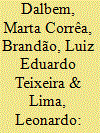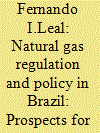| Srl | Item |
| 1 |
ID:
127911


|
|
|
|
|
| Publication |
2014.
|
| Summary/Abstract |
Wind energy has been negotiated in Brazil's regulated market through auctions organized by the government. Bilateral negotiations in the free market have been scarce. In 2011 wind farms were allowed to bid in 'A minus 5 (A?5)' auctions, for energy with first delivery date 5 years ahead. This new design was expected to stimulate negotiations in the free market, as the 20-year contract in the regulated market eases financing while the 5-year grace period grants wind farms the option to sell whatever energy is generated beforehand in the free market. We modeled bidders' price decision in A?5 auctions as Real Options and concluded that given the low prices averaging USD 50/MW h, winners are tempted to defer investment, expecting more favorable equipment and energy prices, or a better knowledge of the wind site. Construction is likely to begin in 2-3 years, with little time left for the free market. Bidders that consider the option of eventually abandoning the project are more price competitive, increasing chances that some wind farms will never materialize. Therefore, this attempt to foster the free market may not pay-off and, moreover, it may have the unfavorable effect of turning Brazil's energy expansion planning a more difficult task.
|
|
|
|
|
|
|
|
|
|
|
|
|
|
|
|
| 2 |
ID:
166442


|
|
|
|
|
| Summary/Abstract |
The study comprises an analysis of the most relevant oil and gas (O&G) legislation and policy, focusing on the development of natural gas (NG) infrastructure and market in Brazil. The paradigms for the study were the regulatory frameworks of the O&G industry in Brazil and Argentina, since they are relevant members of the Mercosul economic block. A comparative assessment was performed in order to better understand the bottlenecks and drawbacks for the NG market expansion in Brazil, considering successful examples of recent legislation advances of other countries. Also, the sanction imposed by ANEEL Resolution n. 583 of 2013 on natural gas suppliers, due to the lack of supply for thermoelectric utilities was evaluated. Since current calculations have introduced asymmetries concerning the indicators employed, while using parameters intrinsic to the electricity sector, an alternative formula was proposed, decreasing the sanction value on the supplier without compromising the contract neutrality.
|
|
|
|
|
|
|
|
|
|
|
|
|
|
|
|